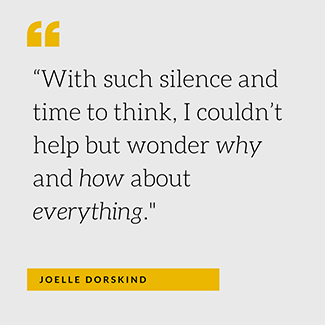For nine years, I went to summer camp in the Poconos, far away from highways and large cities in a small town near Scranton, Pennsylvania. Each summer my counselors would take our bunk on a “sneak out,” where we would go to the top of a hill, lay down in the grass and stare up at the stars. I remember being so curious. With such silence and time to think, I couldn’t help but wonder why and how about everything.
Twenty years later, I was invited to sit on an alumni panel at my university to describe the path that led me to science. While I detailed the classes and internship opportunities that literally enabled me to attend graduate school, I realized that I had left out everything that came before, and the subtle moments that actually instilled a drive for curiosity and a thirst for discovery.
 My childhood home was my true first laboratory. I was destined to follow a path of creativity from birth. My parents are writers and artists. Throughout my childhood, I was always encouraged to read, think about difficult questions and express myself through music and art. My mother is a fantastic cook and often let me assist her in the kitchen. We’d mix and measure, and she’d explain the quantities and differences in consistency that adding different materials caused. It’s interesting to reflect on these experiences as I work at my lab bench, pouring a buffer into my beaker and realize the familiarity of this motion.
My childhood home was my true first laboratory. I was destined to follow a path of creativity from birth. My parents are writers and artists. Throughout my childhood, I was always encouraged to read, think about difficult questions and express myself through music and art. My mother is a fantastic cook and often let me assist her in the kitchen. We’d mix and measure, and she’d explain the quantities and differences in consistency that adding different materials caused. It’s interesting to reflect on these experiences as I work at my lab bench, pouring a buffer into my beaker and realize the familiarity of this motion.
Camp became my second laboratory. At 8 years old, I had never been away from home for more than one night, and now I would be away for eight whole weeks, sharing a bunk with nine girls I had never met and relying on counselors to take care of me. Everything that first summer was an experiment: trying new food, playing new sports, meeting new friends, boating, fishing and hiking. It was so scary and so unknown, but with each risk came an unbelievable reward: lifelong friendships, hobbies and skills.
Finally, the classroom was an essential part of my journey to becoming a scientist. You can’t help what you love, and for me, I couldn’t help but love chemistry. I loved how mixing two chemicals could create a new compound; the cause and effect of the reaction was so apparent and made so much sense. I loved figuring out cause and effect and applying this knowledge to human biology.
As I sat on the panel and answered the question, “How did you know you wanted to become a scientist?” I realized it wasn’t a simple decision I made after taking a class or reading a book. Instead, 22 years of doing experiments in my kitchen, painting in my backyard, stargazing at camp, playing soccer and studying helped me make this decision. Science is such a personal career that it makes sense it would take such a long journey to come to it.
